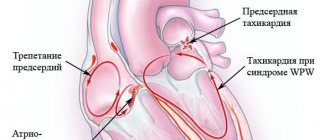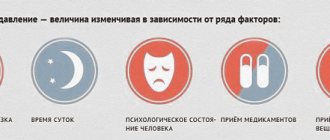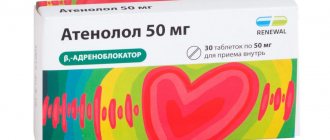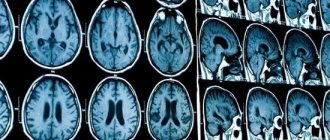Tachycardia is one of the most common heart rhythm disorders. The main mechanism for the development of pathology is to increase the automaticity of the sinus node. In this case, the heart rate increases to more than 90 beats per minute. Tachycardia may not have subjective manifestations. Most often it is felt as increased heartbeat. In the presence of pathologies of the cardiovascular system, this type of arrhythmia can worsen the general condition and provoke the development of complications. Therefore, treatment of tachycardia should be prescribed and strictly monitored by a specialist.
How does tachycardia manifest?
It is important to distinguish between tachycardia:
- as a normal physiological phenomenon during physical activity, anxiety, anxiety or fear. Most often, the cause is the body’s normal reaction to external stimuli: time zone change, use of tonics or medications, stress;
- as a pathological phenomenon - increased heart rate at rest or increased heart rate that is not adequate to the load. The cause may be cardiovascular disease or dysfunction of other organs.
There are many types of tachycardia. Only professionals and highly qualified specialists can determine whether you have symptoms or a predisposition to the disease, and what type of tachycardia is bothering you. By making an appointment with a doctor at the Federal Scientific and Clinical Center of the Federal Medical and Biological Agency, you will undergo a full examination using new high-tech equipment, receive advice and recommendations on preventing the occurrence of symptoms.
Increased heart rate and low blood pressure
An increased heart rate is quite possible even with low blood pressure. A sharp decrease in blood pressure can be observed during shock conditions (anaphylactic, traumatic, infectious-toxic, psychogenic and other types of shock). The body responds by speeding up the contraction of the heart muscle to restore blood pressure. A similar compensatory nature of increased heartbeat also occurs with large blood loss.
Forms of tachycardia
Our heart consists of several sections. As it contracts, it pumps blood throughout the body. When a person is excited, the heart beats faster. The pulse generator, the so-called, controls the work of the heart. sinus node. In normal mode, an impulse originates in the sinus node, which subsequently spreads to other chambers of the heart. When the nervous system affects the sinus node (for example, in diseases of the thyroid gland), it can generate a rapid heartbeat. In some diseases, the role of the pacemaker moves to the cells of the conduction system of the heart, which are located in the atria, atrioventricular node or ventricles. Tachycardia can be classified based on where the electrical impulse originated.
Experts identify several forms:
- Sinus – fast heartbeat with normal pulse, i.e. The heart rate exceeds the norm of 90 beats per minute, but the pulse is rhythmic with equal intervals between pulse fluctuations. This condition is normal and can occur under the influence of physical or emotional stress. Often this is a functional impairment. But sinus tachycardia may indicate heart failure, anemia, or intoxication.
- The atrial form of tachycardia, which can be asymptomatic, is characterized by a strong heartbeat. Occurs in any small area of the atrium. It is episodic and manifests itself as a sudden onset of palpitations. It can be unstable, but repeated, or continuous and stable;
- Atrioventricular - known as nodal tachycardia, because. the ectopic focus (voluntary contraction) is located in the atrioventricular node. It occurs quite often, especially in people under 45 years of age, mostly in women. This is due to greater susceptibility to emotional influences or congenital characteristics of the conduction system of the heart.
- Ventricular – rapid heartbeat from 100 to 220 beats per minute, characterized by an increase in the number of contractions in the ventricles. This occurs due to the disturbed structure of the myocardium, resulting in difficult transmission of electrical impulses to other parts of the heart. The work of the organ at such a pace can lead to ventricular fibrillation - complete disorganization of cardiac functions and cessation of blood circulation. It is important that ventricular tachycardia is always of organic origin, it is not functional;
Identification of one of the forms of tachycardia may indicate dysfunction of the endocrine, autonomic nervous and other systems of the body. For an accurate determination, you should contact a specialist. Doctors at the Cardiology Center of the Federal Scientific and Clinical Center of the Federal Medical and Biological Agency will conduct a full examination of your heart in order to determine the form of tachycardia with 100% accuracy and give recommendations or prescribe treatment.
Features of the treatment of heart rhythm disorders
If patients experience irregular beating of the upper chambers of the heart, arrhythmia is diagnosed. For example, after a good amount of stress, the atria become out of sync with the lower chambers, called the ventricles. When this happens, not all the blood is pumped out of the heart. This can cause blood to fill the atria, which can cause clots to form. If one of these clots begins to move, it can restrict blood flow to the brain, which in turn can lead to a stroke.
Arrhythmia can lead to stroke
People with arrhythmia may suffer from strong and irregular heartbeats both on a regular basis and in certain abnormal life situations. Fortunately, modern pharmaceuticals offer many medications for the treatment of arrhythmia. Cardiologists usually do not recommend treating heart problems with natural remedies, but rather immediately start taking synthetic drugs.
Only tablets will quickly and effectively help regulate and control your heart rhythm and its speed. As a positive side effect, patients may notice a decrease in high blood pressure and an overall feeling of well-being. In addition, most of the following medications will also help prevent blood clots.
Causes
The causes of tachycardia can be divided into two blocks:
- Intracardiac - the cause should be sought in the heart. These may be congenital or acquired heart diseases. Among them:
- cardiac ischemia;
arterial hypertension;
- myocardial infarction;
- heart failure;
- heart defects;
- cardiosclerosis;
- cardiomyopathy;
- myocarditis;
- idiopathic - primary.
- Extracardiac - the cause of an increased heart rate can be various factors not related to the heart: disease of other organs or systems of the body, or exposure to external factors. In this case it could be:
- physiological reasons - physical activity, severe anxiety, emotional stress;
neurogenic - disruption of the cerebral cortex and subcortical nodes, disorders of the autonomic nervous system (neuroses, psychoses);
- diseases of the endocrine system;
- acute blood loss;
- severe pain attack;
- taking medications that affect the functioning of the sinus node;
- fever due to infectious diseases;
- consumption of tonics - coffee, energy drinks;
- bad habits – smoking, excessive consumption of alcoholic beverages.
Determining the causes of tachycardia is extremely important for prescribing the correct treatment. It is not enough to simply eliminate the pathology; it is important to understand what causes it.
Blood thinners for heart problems
Separately, it is worth considering blood thinners, which are prescribed to prevent the formation of dangerous blood clots. These medications include antiplatelet agents and anticoagulants, which have the side effect of increasing the risk of bleeding. If a doctor prescribes one of these drugs to a patient, this means that great care must be taken with any injury, surgery, or even dental procedures.
Antiplatelet agents
These drugs work by directly affecting the function of platelets in the blood. Platelets are special cells that help stop bleeding by sticking together and forming a clot.
List of drugs with antiplatelet action:
- clopidogrel (Plavix);
- prasugrel;
- tirofiban (aggrastat);
- dipyridamole.
Symptoms
Symptoms may vary depending on the form of tachycardia and how severe it is (what causes it, how long it lasts). Often, tachycardia can be asymptomatic or accompanied by ordinary malaise.
Among the most common:
- cardiopalmus;
- dizziness;
- weakness;
- shortness of breath;
- insomnia;
- feeling of lack of air;
- fatigue;
- decreased appetite;
- decreased performance;
- worsening mood.
Without proper treatment, complications may occur, so you should consult a doctor if these symptoms are detected.
When is palpitations a reason to see a doctor?
A rapid heartbeat is a reason to see a doctor if it:
- too intense;
- is protracted (does not go away for a long time);
- occurs with less and less exposure to the above factors;
- occurs independently of the above factors;
- is uneven in nature (arrhythmia can be assumed - a violation of the heart rhythm).
In these cases, rapid heartbeat may be a manifestation of serious disorders and diseases, such as:
- avitaminosis;
- anemia (low hemoglobin and iron in the blood);
- tetany (a condition caused by a lack of calcium);
- endocrine diseases;
- heart pathologies.
However, as a rule, in the case of myocarditis, other heart diseases, and hyperthyroidism, palpitations are not the main complaint. With such diseases, first of all, they complain of pain in the heart and shortness of breath.
It is necessary to react promptly if, against the background of increased heartbeat, dizziness, shortness of breath, pale skin, and sweating are observed. In this case, you should call an ambulance.
Diagnosis of tachycardia
At the Cardiology Center of the Federal Scientific and Clinical Center of the Federal Medical and Biological Agency, the diagnosis of tachycardia and its forms is carried out by qualified specialists. During the initial visit, the doctor collects the necessary data about the patient: complaints, lifestyle, bad habits. Next, an examination is carried out: the patient’s skin color (with oxygen deprivation it looks pale), the heart rate and respiration rate are calculated. At this stage, heart murmurs may be detected, which will suggest certain causes.
Afterwards, the doctor gives a referral for the collection of laboratory tests and instrumental examination methods, such as ECG, ultrasound of the heart, monitoring, etc.
The FSCC FMBA has several heart examination programs. You can find out more about each by following the link.
Emergency care for tachycardia
At home, if tachycardia occurs, the following measures are taken:
- you need to take a horizontal position,
- you can drink a sedative of herbal origin,
- If the patient has previously had an attack of tachycardia, the cause is known and the patient has recommendations for treatment, then you can take the medicine that was prescribed by the doctor to stop the tachycardia.
If the measures taken do not lead to restoration of the heart rhythm, then it is necessary to call an ambulance.
Prevention
If you have diseases of the cardiovascular system or have symptoms of tachycardia, preventive measures should be taken.
Even if you are completely healthy, you need to follow some rules that will help keep your heartbeat normal.
For a healthy person it is enough:
- adhere to a healthy lifestyle: move actively and regularly, follow a routine and keep your body in good shape;
- monitor proper nutrition and weight;
- refrain from bad habits.
Depending on your health condition, traditional medical care or surgery may be used.
Only professional diagnostics can determine preventive measures to prevent tachycardia. Therefore, it is necessary to contact the specialists of the Federal Scientific and Clinical Center of the Federal Medical and Biological Agency, because Prevention includes the use of medications, such as sedatives.
Do not self-medicate, contact specialists of the Federal Scientific and Clinical Center of the Federal Medical and Biological Agency for professional help.
How can a doctor help with a strong heartbeat?
If you have a complaint about palpitations, you should contact a general practitioner or cardiologist.
When a patient complains of increased heartbeat, it is first necessary to establish its cause - whether it is of physiological or pathological origin. For this purpose, laboratory and instrumental studies may be prescribed, including ECG, echocardiography (ultrasound of the heart), and radiography of the heart. After identifying the cause of the increased heart rate, a course of treatment is prescribed aimed at eliminating pathological factors. Normalization of the heartbeat is achieved through treatment with antiarrhythmic drugs. Such drugs should not be taken on your own; they should be prescribed by a doctor in accordance with the condition of your body, established on the basis of a medical examination. Otherwise, the treatment result may be negative.
Treatment of tachycardia
Depending on the form of tachycardia, various treatment methods are used. Somewhere it is necessary to eliminate external factors, such as refusal of certain physical activities. Somewhere they resort to prescribing medications, as in cases of stress (sedatives), and in serious situations - surgical intervention.
In the therapeutic departments of the Cardiology Center, you will be examined and drug therapy will be selected. If you have a form of tachycardia that can be eliminated, then you may undergo catheter ablation (exposure to the source of the arrhythmia with radiofrequency or cold).
Rapid heartbeat with normal blood pressure
However, increased heartbeat can be felt regardless of blood pressure. The pressure may be low or normal, but the patient complains of palpitations. This is possible with vegetative-vascular dystonia, anemia, thyroid diseases and a number of other diseases. You should not try to determine what you are sick with, much less begin treatment only on the basis of comparing your heartbeat and blood pressure. In all cases when you are concerned about increased heart rate, you must undergo an examination as prescribed by your doctor.
Cardiac cough: how to recognize pathology
Cough as a symptom accompanies not only colds, but also a number of others. Moreover, in each case it will have its own specifics. A cardiologist explained to us what a cardiac cough is and how it differs from the others.
Nino Revazovna Malania, cardiologist, answered the questions
1st category FSBI “National Medical Research Center named after. acad. E.N. Meshalkin" of the Ministry of Health of Russia, Member of the ESC (European Society of Cardiology) and RKO (Russian Society of Cardiology).
– What is a cardiac cough?
– To begin with, I would like to say what the cough itself is. This is a protective-adaptive reaction that occurs as a result of irritation of receptors that are located in the respiratory tract, and therefore it is traditionally associated with pathologies of the respiratory system.
However, cough is often a serious symptom of a disease of the cardiovascular system, progressive heart failure. The reason is the occurrence of congestion in the lungs, which occurs when the heart is not able to pump blood normally. Most often, the essence lies in the improper functioning of the left ventricle.
Pathological processes occurring in the left ventricle cause a decrease in its contractility, and it cannot effectively pump blood coming from the pulmonary arteries to the aorta. Such changes in the functioning of the heart lead to an increase in pressure in the lungs and a slowdown in blood microcirculation. Slow blood flow causes increased venous pressure and oxygen starvation of tissues. Due to hypoxia, collagen fibers are deposited on the interalveolar septa and walls of small vessels, which cause the development of pneumosclerosis. The small vessels of the lungs gradually become sclerotic and completely obliterated (overgrown with connective tissue). Such pathological processes lead to a decrease in blood flow in the lungs and an even greater increase in pressure in the pulmonary vessels.
Increased pressure in the pulmonary artery leads to increased load on the left ventricle, and it hypertrophies. Then dilatation (expansion of the boundaries) of the right half of the heart occurs, which causes stagnation of the systemic circulation. The liquid part of the blood seeps into the lung tissue and irritates the bronchial receptors.
The patient develops a cardiac cough, which is chronic, appears when trying to take a horizontal position and worsens in the evening or at night.
– What diseases cause cardiac cough?
– A cardiac cough may indicate that the patient has heart failure, which is formed as a result of certain diseases, such as: coronary heart disease, heart defects, myocarditis, cardiomyopathy, arterial hypertension, arrhythmias, etc.
– How to distinguish a cardiac cough from another, allergic or infectious nature?
– Cardiac cough in heart failure occurs occasionally, under certain conditions, for example, at a height of physical activity (the greater the physical activity, the stronger the cough) or when the patient’s body position changes (the cough intensifies when the patient is lying down and therefore often appears at night).
There are other characteristic symptoms: dry cough (no sputum when coughing); in the initial stages there is shortness of breath, a feeling of lack of air, in the future coughing can be provoked even by prolonged communication (during a conversation by the patient); in decompensated patients, the cough forces them to sleep while sitting, as it intensifies when the patient is lying down, orthopnea; cyanosis - manifests itself as blue discoloration in the area of the nasolabial triangle, earlobes, fingertips - drumsticks; presence of heart pain and rapid heartbeat; dizziness, fainting or lightheadedness; When coughing, swelling of the veins in the neck is observed.
A cough of an allergic nature can often be associated with the action of an allergen (during the flowering period of certain plants, after sleeping on a pillow with fluff, or after interacting with a pet). Characteristic accompanying symptoms of an allergic cough: runny nose and sneezing; redness of the eyes and watery eyes; sore and itchy throat and others. The use of anti-allergy drugs to relieve an attack is effective.
An infectious cough is often associated with infectious diseases of the respiratory tract, which are caused by viruses or pathogenic bacteria.
Characteristic symptoms: severe paroxysmal cough (productive); discomfort and pain in the chest, increasing at the height of the respiratory movement of the chest; shortness of breath during physical exertion, and sometimes at rest; weakness, lethargy, apathy, increased fatigue; increased body temperature and others.
If the primary patient, at the height of physical activity, begins to notice the appearance or intensification of shortness of breath and dry cough, or a “night” cough appears, then you need to contact a general practitioner to undergo a complex examination.
If a patient with a cardiac history develops a dry cough mainly at night, exercise tolerance has decreased, as shortness of breath and coughing have increased, coughing has begun to appear during a conversation - you need to consult a cardiologist as soon as possible to assess the degree of heart failure and correction planned therapy.
– Are there any risk groups for this type of pathology?
– Cough can develop as a result of various pathological conditions and diseases of the heart and blood vessels, if the therapy of the underlying disease is not adjusted in a timely manner and the increase in heart failure is not controlled, for example, in diseases such as coronary heart disease, heart defects, myocarditis, cardiomyopathy, arterial hypertension, arrhythmias, etc.
– Why is a cardiac cough dangerous?
– Cough of cardiac origin is a severe and dangerous symptom of heart failure, but proper treatment by a specialist and adherence to a healthy lifestyle will help control the manifestations of heart failure – and the prognosis will be quite favorable.
In most cases, cardiac cough caused by heart failure can be corrected with drug therapy and lifestyle modifications; more radical measures, including surgery if indicated, are possible.
A cardiac cough can progress rapidly and lead to severe pulmonary congestion, so it should not be ignored and should be contacted by a medical professional when it first appears.
– Is it possible to get rid of a cardiac cough, and how?
– When the first episodes of cardiac cough appear, the patient must consult a cardiologist and undergo examinations, based on the results of which a course of treatment for the underlying disease that caused it is prescribed. Timely treatment of the detected disease will quickly get rid of the cough and slow down the progression of the underlying disease. Drug therapy and lifestyle modification are the main guarantors of the patient’s quality of life in the future. If necessary, surgical correction methods are possible if they are indicated for the patient.










